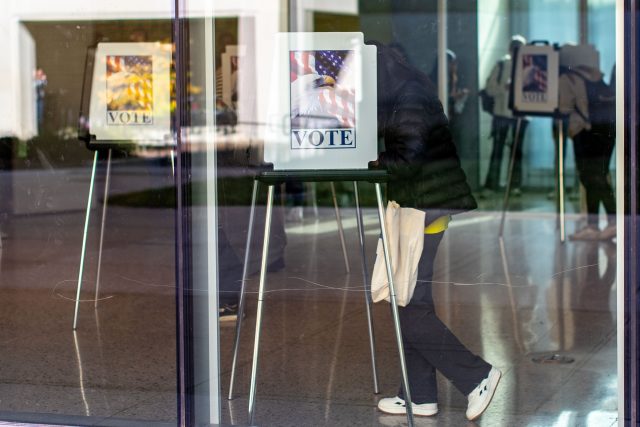[ad_1]
Election officials from battleground states across the country met for a public forum on election security titled “Ballots and Battlegrounds” Thursday evening. The panel was held at the Gerald R. Ford Presidential Library and featured Al Schmidt, secretary of the commonwealth of Pennsylvania; Meagan Wolfe, administrator and chief election official of Wisconsin; Jonathan Brater, director of elections of Michigan; Stephen Richer, Maricopa County, A.Z. recorder; Karen Brinson Bell, executive director of North Carolina State Board of Elections, and Gabriel Sterling, the chief operating officer at the Office of the Georgia Secretary of State. The event was organized by Keep Our Republic, a voting advocacy organization, in partnership with the Gerald R. Ford Presidential Foundation, Gerald R. Ford Presidential Library & Museum and Pillars of the Community.
Panelists answered questions from the audience about mail-in voting, election cybersecurity, double voting, noncitizen voting, artificial intelligence, canvassing policy, voting machines and recount policy. While the speakers’ answers varied based on their state’s policies, officials repeated common themes of strict list management and voter verification, accurate and transparent vote counting processes and strong cybersecurity programs and specialists.
Sterling told the panel that though confusion about election processes can be deliberately exploited, human mistakes are not the same as widespread fraud, and exercising the right to vote remains incredibly important.
“With millions of people doing millions of processes with millions of votes and millions of pieces of paper, human beings make mistakes,” Sterling said. “Mistakes do not fraud make. Understand that. We work with the press all day explaining the intricacies of elections because the lack of understanding of how these processes work can be exploited. … It’s a program that’s designed to undermine people’s faith in elections.”
Schmidt told voters that the many changes election policy has undergone in recent years is a sign of the degree of effort that goes into accurately conducting the voting process.
“These changes have made elections as safe and secure as they’ve ever been,” Schmidt said. “It takes time to count millions of votes with integrity.”
Brater told the audience that people who try to vote twice in an election are committing a felony, and they will be caught.
“If someone has a voter record in multiple places, they will be referred for prosecution,” Brater said. “Every time you vote you create a public record … and you are going to get caught.”
Brater, Director of Elections of Michigan, told conference attendees that elections are only possible because of the efforts of ordinary people.
“No matter where you live, the day-to-day work is done by the people in your communities,” Brater said. “Most of them are ordinary citizens.”
Ari Mittleman, executive director of Keep Our Republic, said in an interview with The Michigan Daily in an interview with The Michigan Daily that the organization planned this forum to help clarify the election administration process.
“What we’ve been doing since the spring of 2020 is helping demystify election administration. … Tonight is an ask-me-anything town hall,” Mittleman said. “We have dozens and dozens of everyday Michigan voters. It’s a chance for them to have a dialogue — it’s the only time this historic year to have a dialogue with the people who know more than anyone else about election administration and the safeguards in place in each of the battleground states.”
LSA sophomore Matthew Castilho told The Daily he attended this event as part of the Ford Leadership Forum, a U-M student organization related to the Ford Leadership Foundation, which aims to develop student initiatives to solve real-life policy problems.
“We really want to engage in programming, so going out in the state and figuring out what are the issues we’re facing, and coming back from that and being like, ‘How can we develop a program or initiative with either legislators, nonprofits or whoever else wants to help us, and put out a program that’s going to help alleviate these issues?’” Castilho said.
Mittleman said he believes it is increasingly important for students to vote.
“There are more 18- to 25-year-old eligible voters in America today than ever before in American history,” Mittleman said. “And look, the world is an increasingly complicated place. People have every reason to be passionate. We know there’s a lot of passion. It’s been a very bumpy few months on campus last year, but the reason we can protest in the street, the reason we can voice our opinions, the reason we can have a student newspaper, is because for 248 years, we’ve had a democracy, and the backbone of that democracy is the ability to take time and vote.”
Daily Staff Reporter Daniel Johnson can be reached at dbjohn@umich.edu.
Related articles
[ad_2]
Source link











